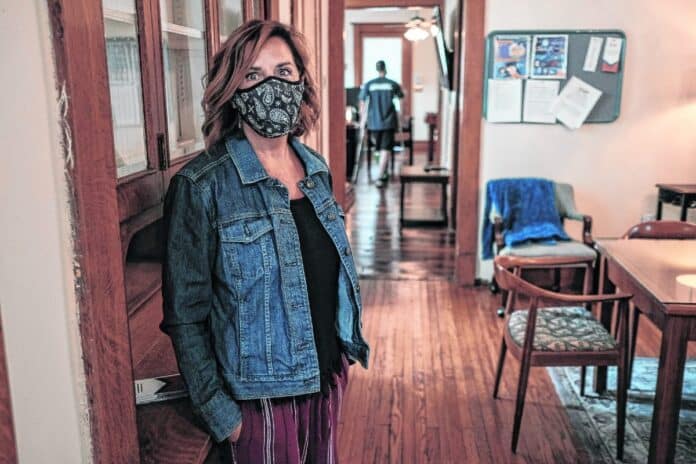
The Alliance for Substance Abuse Progress has opened its first sober living transitional home for men who are attempting to overcome substance abuse disorder, the latest in a series of similar efforts in the Columbus community.
The 1,734-square-foot house, located in the Lincoln-Central Neighborhood in Columbus, opened its doors and welcomed its first resident this past Tuesday. It will initially house up to four male residents — one per room — largely in order to reduce the chances of spreading COVID-19, said ASAP Program Manager Cheryl Buffo. Eventually, ASAP expects the house to reach its maximum capacity of nine residents.
The idea of the homes is to allow residents to build a support network, and to establish job and financial stability amid a structured environment while in the initial stages of recovery.
Residents will have already completed detox, a rehabilitation program or are enrolled in an outpatient treatment setting before moving in.
[sc:text-divider text-divider-title=”Story continues below gallery” ]Click here to purchase photos from this gallery
The length of stay will vary, but there is no time limit. ASAP officials expect residents may stay for a minimum of six months, but hope that most residents stay in their program for a year or longer.
“We’re very excited about (the home),” Buffo said from the house via Zoom. “We just welcomed our first participant today. Similarly, we’re opening a little slowly for two reasons. One because of COVID. We’re only putting one person per room for safety reasons. Also because it’s a new program, we want to start slowly and carefully.”
The house was furnished entirely with furniture donated from the community or paid for through donations, including St. Peter’s Lutheran Church, among others, except for new mattresses and bedding, ASAP officials said.
There is a volunteer house manager at the home in the evenings, who does drug screenings, checks people in every night at curfew, assigns house chores, runs the house meetings and serves as a liaison with other elements of the community-wide support system.
Residents are expected to attend five mutual support group meetings per week, two weekly house meetings and hold down jobs, Buffo said.
“Isolation isn’t conducive to recovery,” Buffo said.
Launched in 2017, ASAP is a community-wide response to address addiction, including the opioid crisis, in Bartholomew County. ASAP formed through a partnership of Columbus and Bartholomew County governments and Columbus Regional Health.
The opening of ASAP’s sober living home comes amid a push for recovery housing and expanded treatment options in the community, with several recovery housing and sober living transitional homes opening, or in the works.
It also comes as local officials attempt to counter a rise in fatal drug overdoses in the community and a surge in relapses. There were 23 confirmed fatal drug overdoses in Bartholomew County as of Aug. 31, compared to a total of 24 all of last year, according to figures from the Bartholomew County Coroner’s Office.
In January, ASAP officials said the lack of available recovery housing in Bartholomew County was a significant gap in the county-wide effort to help people overcome substance use disorder.
Before this year, the closest recovery housing for Bartholomew County women was in Monroe County, and the closest recovery housing for men was in Jennings County, ASAP officials said.
By this winter, local officials anticipate that there will be five homes for men and two homes for women in Columbus.
“The idea that we could have seven or so homes by the end of the year was just a dream on Jan. 1,” said ASAP Executive Director Doug Leonard. “Now we’re seeing it almost fully realized.”
In February, a former church parsonage in Columbus transformed into a recovery home for men opened. The facility, called the Chain Breaker House, 1218 California St., can house up to six men who are in treatment with alcohol or drug abuse issues and has two bedrooms, study areas, a kitchen, living room and finished basement, organizers said.
Other homes also being planned, including the Fresh Start Recovery Center, an addiction treatment facility for expectant women and mothers at 703 Washington St., which is expected to open later this year, Buffo said.
Last month, Centerstone opened a 4,519-square-foot recovery home at 1680 Whitney Court on the north side of Columbus that is expected to house up to 12 men.
ASAP also hired Ascension Recovery Services with the help of a grant from the Rx Abuse Leadership Initiative to develop a tool kit that could serve as a step-by-step guide for anyone wishing to establish a sober living home.
“We’re extremely excited that we’re not only opening the ASAP sober living home today (Sept. 1), but also through the dialogue and the connections that we’ve brought together in the community, several other homes are going to come,” Leonard said.
[sc:pullout-title pullout-title=”Where to learn more” ][sc:pullout-text-begin]
Visit www.asapbc.org/asapsoberliving for more information about ASAP, sober living and how to help.
[sc:pullout-text-end]




